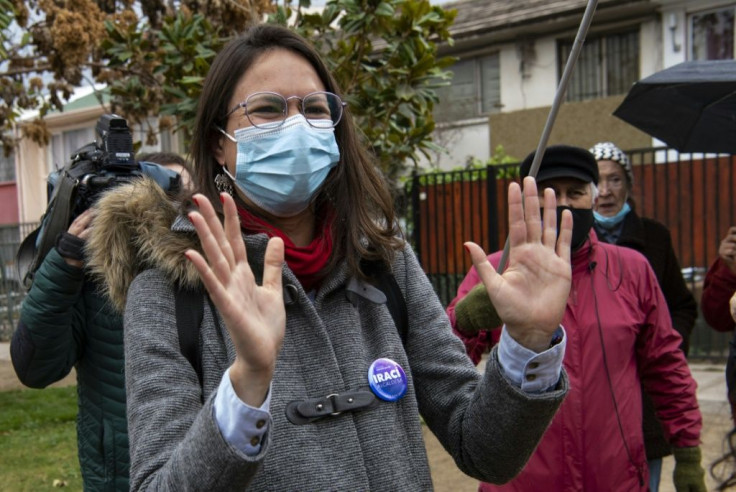Iraci Hassler: Chile's Rising Star And First Communist Mayor In Santiago
Until last Sunday, Iraci Hassler was a relative unknown in her native Chile, but the 30-year-old economist is set to take the reins as the first communist mayor of the municipality of Santiago, the area at the heart of the capital.
"Transformative forces are making significant advances in Chile," Hassler told AFP in an interview, adding that she would focus on a development model that promotes "dignity."
Hassler was one of a number of unexpected victors during elections last weekend, principally aimed at picking the members of a new body that will rewrite the Augusto Pinochet dictatorship-era constitution.
But voters also elected local mayors, councillors, and for the first time, regional governors.
"We saw that there was a lot of support, a lot of love, in the markets, on social media, especially amongst the youth," Hassler told AFP.
"Many people naturally became campaign activists, therefore I for one expected such a result."
Santiago's greater metropolitan region of seven million people is divided into 37 municipalities.
In the center is the municipality of Santiago that includes the civic center and presidential palace -- occupied by right-wing President Sebastian Pinera -- amongst 400,000 inhabitants.
Hassler views her election as the natural culmination of a social movement that exploded into life in October 2019.
Originating as a student revolt against a hike in metro fares, hundreds of thousands of people then came out onto the streets demanding change.
At the heart of their discontent was the ultra-liberal economic model that they blamed for the rampant inequality in a country long lauded for its economic prosperity.
"Transformative forces are making significant advances in Chile and I think that also has something to do with what happened in the Santiago commune and on a national level," she said.
When the protests broke out, demonstrators chanted "Chile Awakens" and painted the phrase all over the capital.
"I think there has been a moment of empowerment of people and of an awareness that, although it seemed latent in Chilean society, has been strongly expressed since October 18 (2019) with a very high level of organization."
Almost half of the elected members of the constitutional convention are independents while left-leaning candidates also fared much better than those from the ruling right.

There were also successes for leftists and women in the local and regional elections that demonstrate "a reflection on an unfair model, the neoliberal model that has been strictly implemented in our country."
Now "the possibility arises to put good living (and) dignity as principal elements at the heart to transform to a new development model."
Communists have long had a bad reputation in Chile, where opponents present them as harbingers of poverty and the expropriation of private property.
But that image is slowly changing, particularly amongst student movements and visible figures such as legislator Camila Vallejo, a 33-year-old geographer, and Daniel Jadue, the Communist Party's presidential candidate for November's elections.
Vallejo made a name for herself during student demonstrations in 2011 demanding better and free education, while Jadue, the mayor of the neighboring working class Recoleta municipality, has introduced affordable community pharmacies.
"I think on the one hand myths have been busted surrounding communists who now have a greater presence in the country's public discussion," said Hassler.
It's been shown, she added, that "communist management in a local government can transform people's lives" and defeat prejudices.
Even the president of the influential confederation of production and commerce, Juan Sutil, heaped praise on the granddaughter of a major businessman.
"She's a well prepared woman ... an economist ... she will be rational," said Sutil.
Hassler, who speaks German and Portuguese due to a Swiss-Chilean father and Brazilian mother, plans to tackle the problems of urban planning, waste management and depleted personal assets.
Although she represents the Communist Party, Hassler says her victory "was genuinely born from Santiago's neighborhoods, in an unprecedented social and political expression."
Even her family were surprised by her victory, though.
"Just like the media and the public, they didn't think it was possible. They're happy things went well," said Hassler, whose municipal council will be made up of eight women and just two men.
© Copyright AFP 2024. All rights reserved.





















